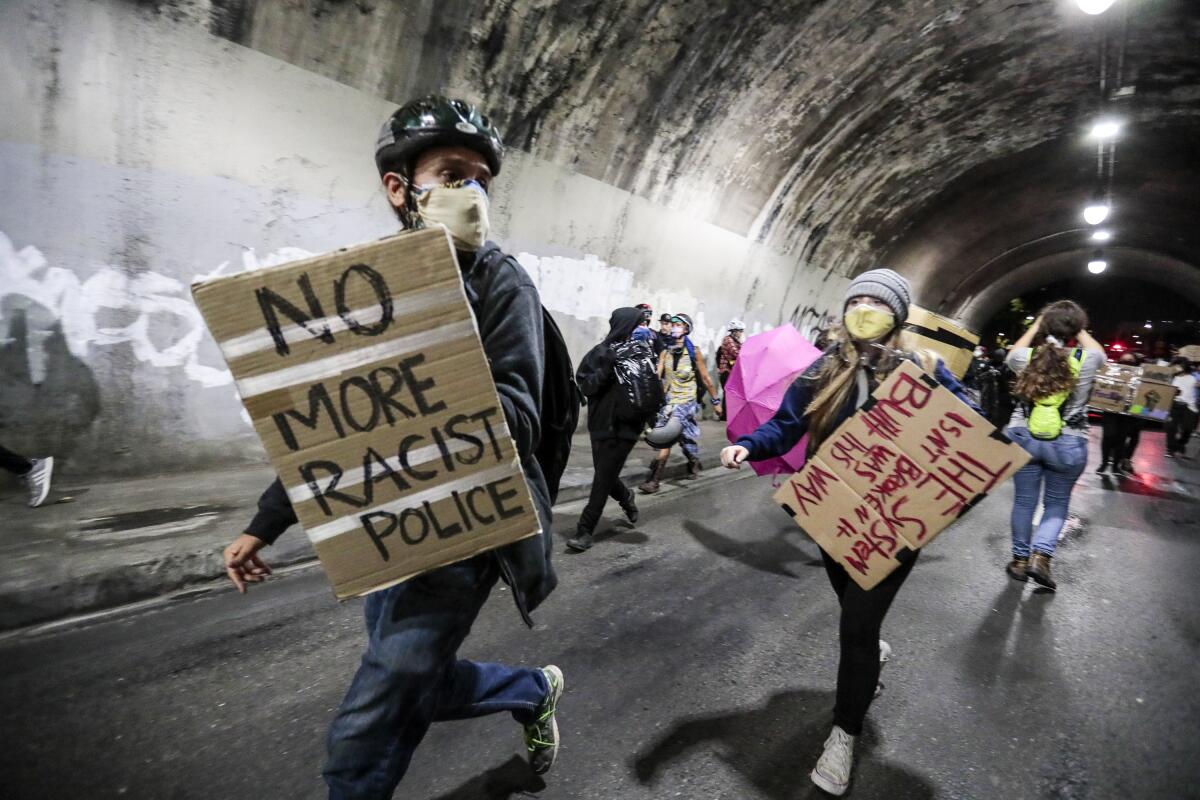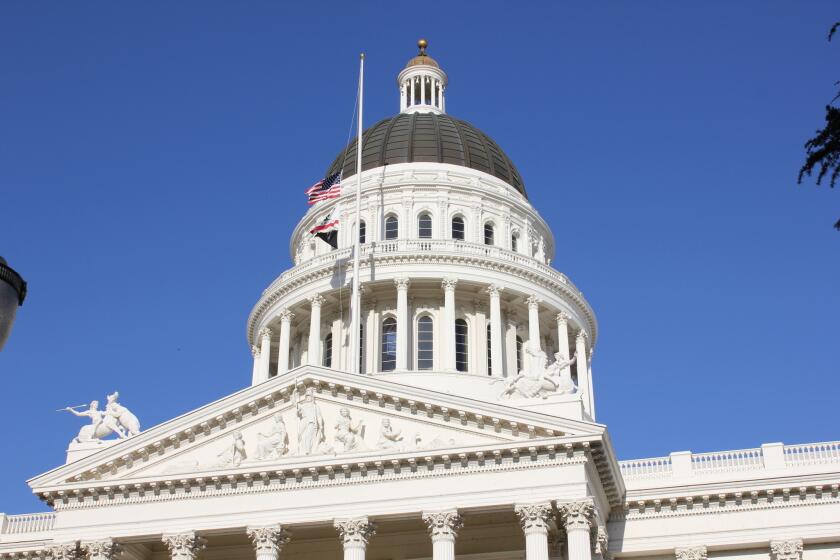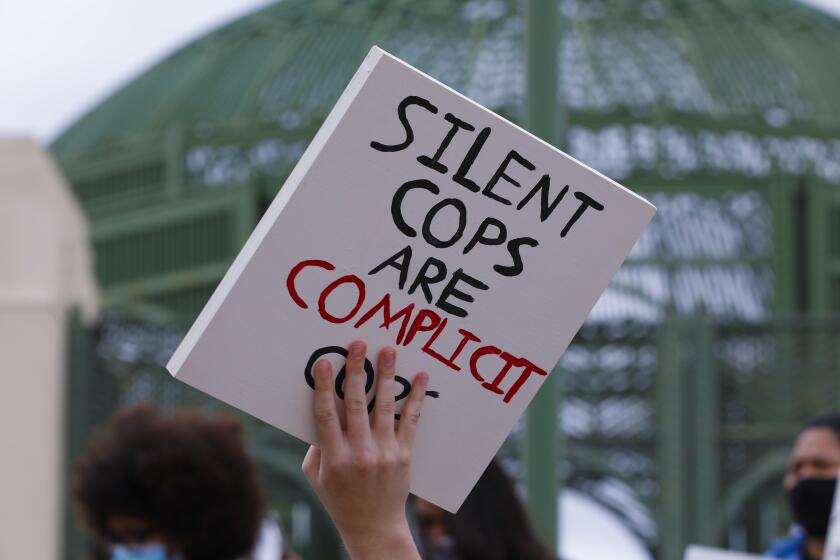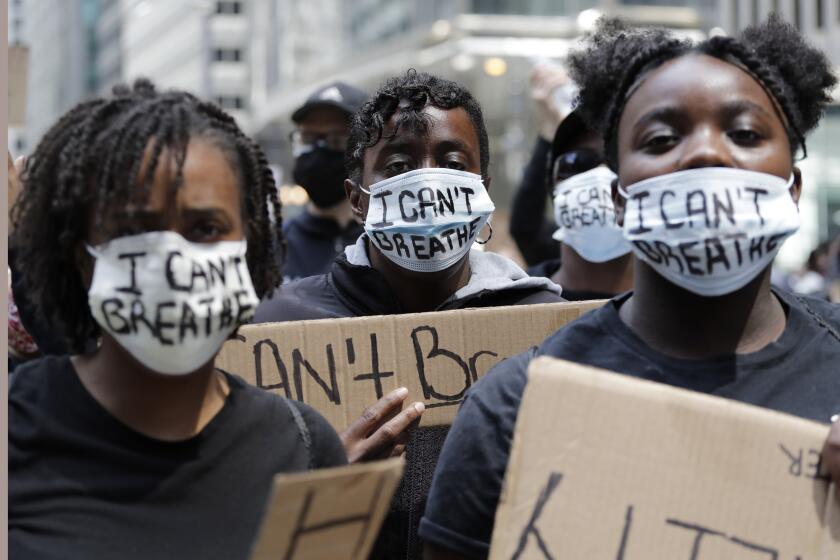How politics and police unions stopped bills to hold bad cops accountable

- Share via
SACRAMENTO — It wasn’t good government. But it was probably good politics.
A major police reform bill was quietly killed by the Assembly speaker without a house vote on the last night of the legislative session. He used an ages-old tactic aimed at sparing politically vulnerable lawmakers from casting a perilous vote.
Call it incumbent protection.
The bill would have assured that when a bad cop’s badge is yanked by a police department, he can’t hook on with another law enforcement agency anywhere in California. The measure also would have made it easier for citizens to file civil lawsuits against rogue officers.
There was broad public support for the measure — but heavy opposition from officers’ unions, police chiefs and sheriffs.
So, it wound up the way these things often do: The legislative leader punted.
Just how big a role should politics play in policymaking? There’s no pat answer. But politics and public policy are intertwined.
Here’s what often happens:
A bill generates hefty combat. Perhaps the public overwhelmingly supports the measure. But powerful interests are adamantly opposed.
It’s a no-win dilemma for lawmakers running for reelection in competitive races. Voters could turn against an incumbent who sides with the interests. But if the lawmaker votes against the interests, he could suffer their wrath. Campaign contributions could be cut off and given to an opponent.
If a bill probably isn’t going to survive a house vote anyway, maybe the wisest move is to pull it off the floor. Avoid the agony of taking a public position in a likely losing cause.
That’s a well-worn page from the legislators’ traditional political playbook.
The police reform bill, SB 731 by Sen. Steven Bradford (D-Gardena), was a textbook example on the legislative session’s final night, Aug. 31.
Assembly Speaker Anthony Rendon (D-Lakewood) concluded the bill didn’t have nearly enough votes to pass his house — it needed a simple majority, 41 — and removed it from consideration.
The people’s representatives couldn’t get their act together amid internal turmoil to agree on a stripped-down $500-million wildfire appropriation before they were forced by law to adjourn the two-year legislative session at midnight Aug. 31.
“It didn’t have the votes — wasn’t even close,” Rendon told me. “I was going to vote for it, but for many it was a tough vote.”
But aren’t legislators paid to cast tough votes? If a bill reaches the floor, shouldn’t it be entitled to a vote?
Bradford certainly thinks so.
“You wouldn’t know whether it had the votes if you’re not willing to take up the bill,” Bradford says. “It’s not uncommon to take up a bill before you have 41 votes. A lot of [house] members might want to hear the floor debate on a controversial bill.”
It’s a fact, however, that debates — no matter how lengthy and passionate — rarely add significantly to vote totals. Occasionally they do. But Bradford would have needed to pick up a bunch of votes — up to 10.
“Did we have 41 identified votes? No,” Bradford says. “But we had potential leanings. We could have worked the floor and gotten 41 votes.”
Well, that was another problem. Because of COVID-19 rules, the senator could not have worked the Assembly floor. Legislators weren’t allowed in the other house’s chamber. That made legislating difficult.
But the biggest obstacle for Bradford’s bill: “The police unions were very effective at putting a lot of fear into members,” he says.
As for lawmakers taking tough votes, Bradford asserts: “That’s why we run for this office. We come here to do meaningful legislation, not nibble around the edges. Meaningful legislation is always a tough vote.….
City councils, boards of supervisors and state legislatures have been afraid to significantly control law enforcement
“A bill should live and die on its own merits…. We would know who our friends are, the people who are willing to stick their necks out.”
That’s what Rendon and legislative leaders usually fear: legislators sticking their vulnerable necks out in public view.
But Bradford acknowledges Rendon’s role as speaker.
“It’s an election year,” the senator says. “It’s the job of leadership to protect members.”
Other police reform bills also perished without votes at the session’s end. They were measures to provide more public access to police misconduct records, ban the use of rubber bullets and tear gas against protesters, and require officers to intervene when a colleague is abusing a citizen — such as George Floyd.
Despite weeks of rhetoric and numerous proposals, California ended its legislative session with only a handful of moderate police reforms. Here’s why.
But legislators did pass some modest bills. One would require the state attorney general to investigate when police kill an unarmed citizen. Another banned the use of chokeholds.
I called Darry Sragow, a veteran political consultant who once was the chief Democratic strategist for Assembly election campaigns. Now he publishes the California Target Book, which handicaps legislative and congressional races.
What does he think of legislative leaders ducking risky votes on bills likely to lose anyway?
“There’s no right and there’s no wrong,” Sragow says. “The fundamental justification for insulating incumbents in competitive reelection races from difficult votes is that — it’s a cliché, but it’s true — you may not win every battle, but you’ve got to win the war.
“It’s a matter of not inflicting substantial damage on the party in favor of some short-term action that may cost the party seats.”
Of course, there’s absolutely no way Democrats in November could lose control of either house — probably not even their two-thirds supermajorities. Democrats hold 61 of 80 seats in the Assembly and 29 of 40 in the Senate.
“The counter argument,” Sragow continues, “is that the policy is too important. ‘We have to take the action.’
“The job of the leader is to balance those conflicting arguments — pressing for a policy change because it’s the right thing to do versus saving the fight for a different day.”
Like during a non-election year.
In America, politics is inseparable from the policymaking of politicians.
More to Read
Sign up for Essential California
The most important California stories and recommendations in your inbox every morning.
You may occasionally receive promotional content from the Los Angeles Times.

















